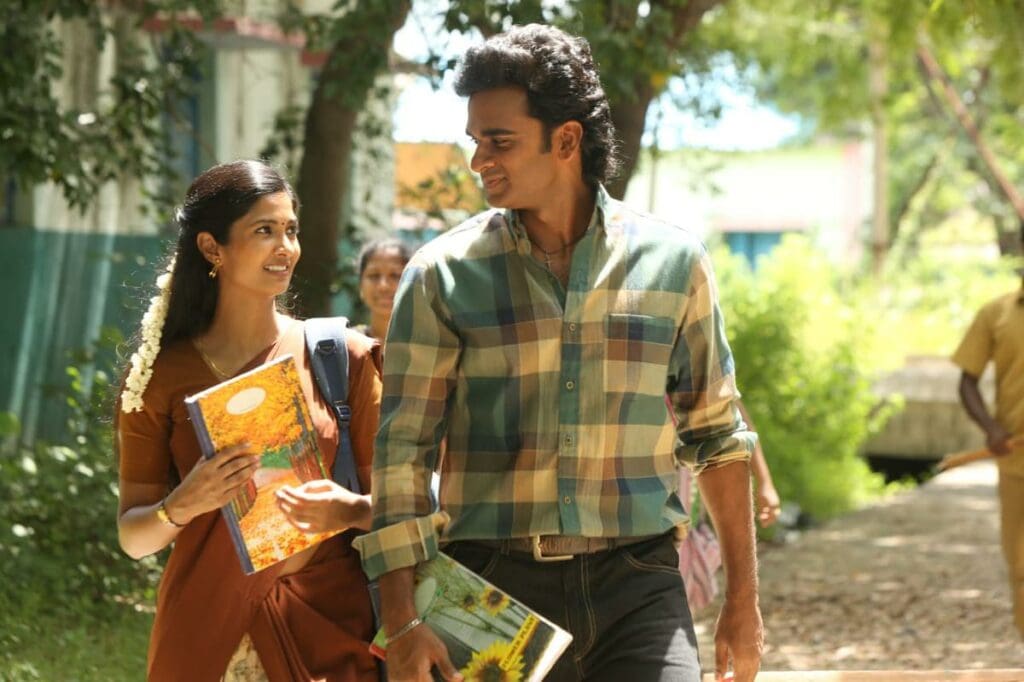
What strikes one the most about Jai Kumar’s ‘Blue Star’ is how the film captures the landscape and culture of Arakkonam with all its vibrancy – the heat, the streets, the people, their religion, the trains, railways stations, colleges, sports, festivals and everything else.
As a film that fuses sports and politics, it is filled with brilliant ideas. The most interesting among them is how it uses cricket as a means to speak anti-caste politics. The street cricket that is popular among the Bahujans and the state and national cricket teams monopolized by Brahmins and other Savarnas serves as a potent premise to speak its Bahujan vs Brahmin politics.
That it uses this premise to advocate the coming together of Dalits and OBCs was particularly interesting. And the film doesn’t just fantasize such a union. But rather, explores the conflicts that might come up and the negotiations that would be required in their working towards a common goal.
The performances of the leading male actors – Ashok Selvan, Shanthanu Bhagyaraj and Prithvi Pandiarajan were all exceptional. In fact, it is tempting to say that Shanthanu and Prithvi go further than Selvan in their ability to make us feel they are real people from the town. This is because Selvan slightly becomes a generic leading hero in the proceedings.
But in spite of all these things going for the film, it leaves us only with a lukewarm feeling. This is primarily because though the film is filled with logical, interesting and even brave ideas, it hardly fleshes them out to real moments. Instead they remain as just ideas that are communicated to us through dialogues. So in several important scenes, what we get is only a piece of information. And not an emotion. It is like a character saying that they are sad for so and so reason. But as an audience, we don’t feel or share the character’s sadness in that moment.
This communication of details through deliberate dialogues happens at several places in the film and prevents it from becoming the landmark film it could have otherwise been. To illustrate it with an example – there is a scene where Ashok Selvan’s character returns from a cricket selection process and meets his girlfriend – played by Keerthi Pandian. And he tells her how his father was hopeful about his selection. And explains how dejected he looked when he got to know that Selvan was not even allowed to participate in the selection process. Here – we get his father’s reaction as a piece of information in the dialogue. But as an audience, we would have preferred to see the father’s reaction in flesh and blood. What could have been an emotional scene that had the potential to punch our gut gets reduced to a mere piece of information here.
While the film is intuitive and understands the need to communicate these emotions at the right points, it doesn’t do it in the right way. It often resorts to simplified ways to tell us these things. This was frustrating because the film otherwise was a splendid mix of sports and politics. Even Govind Vasantha’s score seems to be aware of what the film lacks and he provides it with certain emotional depth. The songs and the score were spectacular. Arivu’s lines and voice deserve special mention for infusing the cricket match scenes with energy.
Keerthi Pandian seemed like a weak performer and her character didn’t fit very organically to the narrative, but one can understand why the romantic angle is important – as it offers a certain mainstream stature to the film.
The film also makes the viewer wondere about the characterization of a particular OBC chracter (Shanthanu character’s uncle) and another possibly Brahmin character (head/coach at the cricket league). In my experience and understanding, OBC individuals in powerful positions might act very territorial. And when anyone challenges them, they might lash out badly. This is because of an inherent insecurity that all backward castes possess – that they believe they have to aggressively safeguard their position. But Brahmin individuals in powerful positions always come across as gentle and kind, even when they are doing the most cruel things behind one’s back. That’s because of how secure and assured they feel in the caste structure – they never have to lose their cool like OBC individuals in similar positions. I wished the film could have differentiated and portrayed these characters better.
One nit-picks about these details only because the film had great potential. And it seems difficult to not wish that they film had pushed itself further. But like this review mentions in the beginning, the film effectively captures the vibrant energy of the Arakkonam town and its underlying Ambedkarite politics. Which was quite satisfying by itself.
Rajesh Rajamani is an acclaimed film-critic and director



